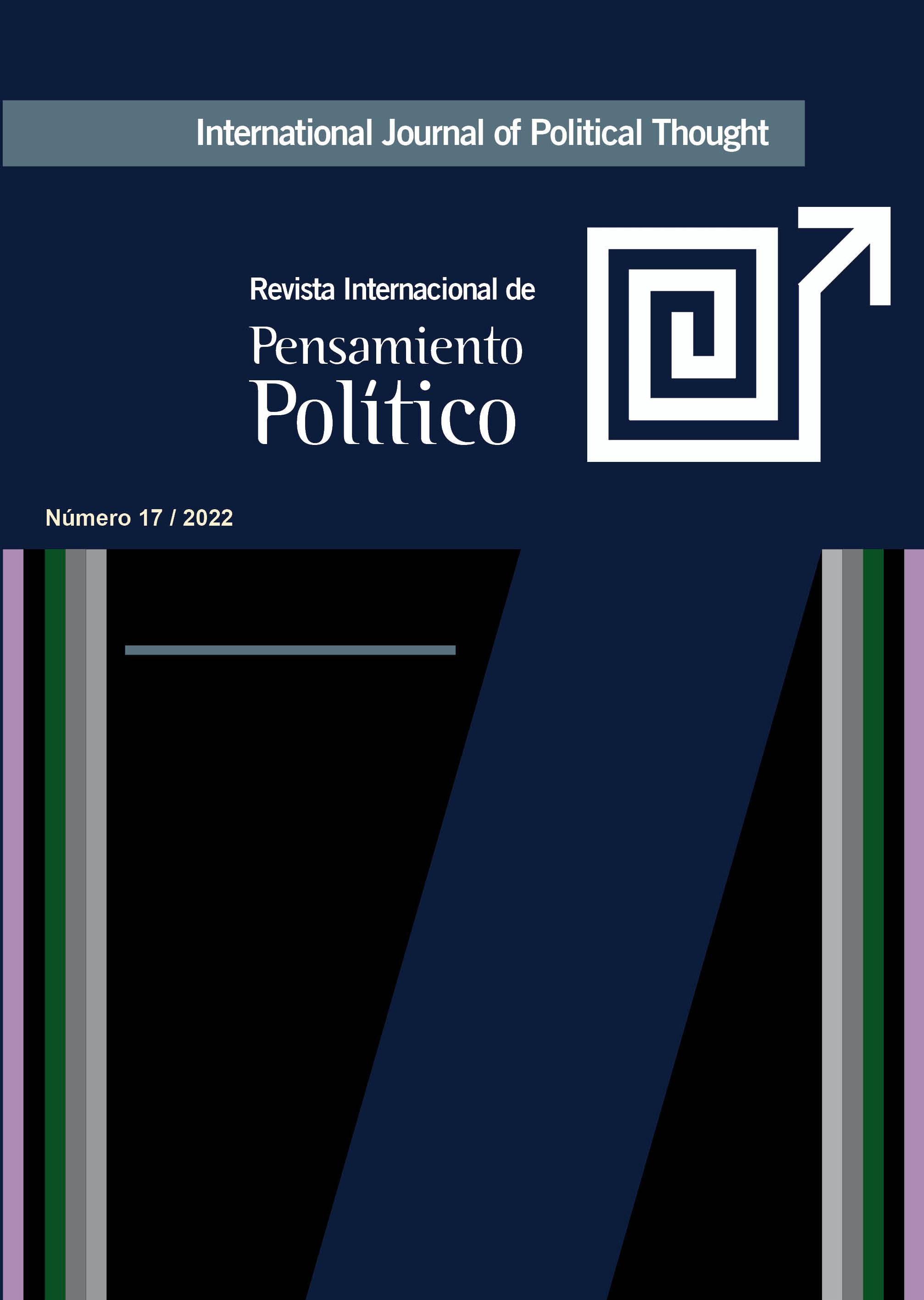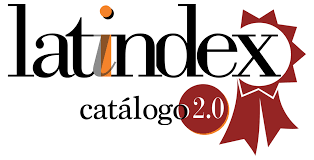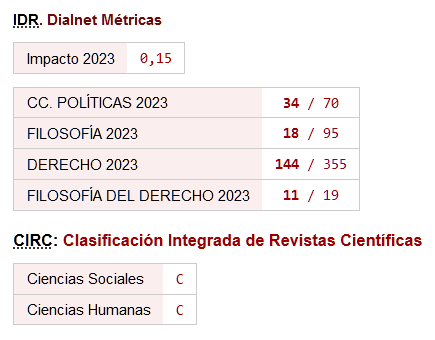Las aporías de una representación desencantada
Una aproximación al concepto del soberano en Max Weber y Carl Schmitt
DOI:
https://doi.org/10.46661/revintpensampolit.7434Palabras clave:
Soberanía, Orden político, desencantamiento, representación, Weber, SchmittResumen
Desde Hobbes, la teorización del soberano se ha mostrado conflictiva en tanto que instancia representativa desencantada. En este estudio se pretende abordar ese problema en la obra de Max Weber y de Carl Schmitt, quienes, partiendo del diagnóstico de la modernidad como desencantamiento del mundo, despliegan dos modelos contrapuestos de la representación política y de la democracia que otorgan un papel central al soberano como última ratio del orden ante la democratización del Estado. A la luz de dos concepciones histórico-antropológicas de la dominación, se detectan tres aporías en esa transición propositiva cruciales para entender la relación entre los dos autores: cómo personificar la dominación impersonal del Estado moderno, cómo acomodar la pluralidad en un orden político desencantado y cómo afrontar la relación ética entre medios y fines en política. Mientras que Weber propondrá una forma republicana en la cual el Presidente, apoyado plebiscitariamente en las masas, actúa consolidando la legitimidad legal-racional del régimen democrático a través de su carisma; Schmitt teorizará una forma inspirada en la Iglesia católica, en la que el soberano actúa como decisor de lo político en la excepcionalidad y como catalizador de la identificación total del pueblo con el Estado bajo la distinción amigo-enemigo.
Descargas
Citas
Abellán, J. (2019). Estado y soberanía. Madrid: Alianza.
Bobbio, N. (1991). Thomas Hobbes. Barcelona: Paradigma.
Brown, W. (2015). Estados amurallados, soberanía en declive. Barcelona: Herder. https://doi.org/10.2307/j.ctvt9k3g2
Dardot, P., & Laval, C. (2021). Dominar: un estudio sobre la soberanía del Estado en Occidente. Barcelona: Gedisa.
Domènech, A. (2019). El eclipse de la fraternidad. Madrid: Akal.
Galli, C. (2010). La mirada de Jano. México D.F: Fondo de Cultura Económica.
Hennis, W. (1983). El problema central de Max Weber. Revista de Estudios Políticos, (33), 49-100.
Herrera, C. M. (2008). La herencia weberiana en la República de Weimar. Res publica.
Hobbes, T. (1992). Leviatán. México D.F: Fondo de Cultura Económica.
Merino, J.L. (2022). El Leviatán en la doctrina del Estado de Carl Schmitt. Entre la crítica y la tragedia. Res publica, 25(2), 155-164. https://doi.org/10.5209/rpub.78722
McCormick, J. P. (1997). Carl Schmitt's Critique of Liberalism: Against Politics as Technology. Cambridge: Cambridge University Press. https://doi.org/10.1017/CBO9780511608988
Mommsen, W. (1990). Max Weber and German Politics, 1890-1920. Chicago: University of Chicago Press.
Rousseau, J.-J. (1980). Del contrato social. Discurso sobre las ciencias y las artes. Discurso sobre el origen de la desigualdad entre los hombres. Madrid: Alianza.
Schluchter, W. (2017). El desencantamiento del mundo. Seis estudios sobre Max Weber. Bogotá: Fondo de Cultura Económica.
Schmitt, C. (1971). Legalidad y legitimidad. Madrid: Aguilar.
Schmitt, C. (1990). Sobre el parlamentarismo. Madrid: Tecnos.
Schmitt, C. (1996). Sobre los tres modos de pensar la ciencia jurídica. Madrid: Tecnos.
Schmitt, C. (2000). Catolicismo y forma política. Madrid: Tecnos.
Schmitt, C. (2003). El Leviatán en la teoría del Estado de Thomas Hobbes. Granada: Comares.
Schmitt, C. (2009a). El concepto de lo político. Madrid: Alianza.
Schmitt, C. (2009b). La era de las neutralizaciones y las despolitizaciones. En C. Schmitt, El concepto de lo político (págs. 107-123). Madrid: Alianza.
Schmitt, C. (2009c). Teología Política. Madrid: Trotta.
Sieyès, E. (1994). ¿Qué es el Tercer estado? y Ensayo sobre los privilegios. Madrid: Alianza.
Skinner, Q. (2020). La llibertat abans del liberalisme. Girona: Edicions de la ela geminada.
Strauss, L. (2008). Comentario sobre El concepto de lo político. En H. Meier, Carl Schmitt, Leo Strauss y "El concepto de lo político": sobre un diálogo entre ausentes (Vol. 3040). Buenos Aires: Katz Editores. https://doi.org/10.2307/j.ctvm7bdm9.5
Villacañas, J. L. (1999). Crítica de la teología política. En M. Cruz, Los filósofos y la política. México D.F: Fondo de Cultura Económica.
Villacañas, J. L. (2005). Max Weber entre liberalismo y republicanismo. Isegoría, (33), 127-141. https://doi.org/10.3989/isegoria.2005.i33.421
Villacañas, J. L. (2008). Poder y conflicto: ensayos sobre Carl Schmitt. Madrid: Biblioteca Nueva.
Villacañas, J. L. (2020). Weber y Schmitt sobre Weimar: la legitimidad de una continuidad. En J. L. Villacañas, & J. Maiso, Laboratorio Weimar: la crisis de la globalización en Euroamérica (1918-1933) (págs. 69-110). Madrid: Tecnos.
Villacañas, J. L., & Maiso, J. (2020). Laboratorio Weimar: la crisis de la globalización en Euroamérica (1918-1933). Madrid: Tecnos.
Weber, M. (1982). La futura forma institucional de Alemania. En M. Weber, Escritos Políticos II (págs. 253-294). México D.F: Fondo de Cultura Económica.
Weber, M. (1986). Excurso. Teoría de los estadios y de las direcciones de rechazo religioso del mundo. En M. Weber, Ensayos sobre sociología de la religión I. Barcelona: Taurus.
Weber, M. (2002). Economía y Sociedad. Madrid: Fondo de Cultura Económica.
Weber, M. (2004). La ética protestante y el espíritu del capitalismo. Madrid: Alianza.
Weber, M. (2008). Escritos Políticos. Madrid: Alianza.
Weber, M. (2015). El político y el científico. Madrid: Alianza.
Weber, M. (2020). Sociología del poder. Madrid: Alianza.
Descargas
Publicado
Cómo citar
Número
Sección
Licencia
Derechos de autor 2022 Lorién Gómez Solano

Esta obra está bajo una licencia internacional Creative Commons Atribución-NoComercial-CompartirIgual 4.0.
Política de acceso abierto
Se permite el acceso libre y abierto de cualquier interesado a todos los contenidos de los números de la revista, sin costo alguno, pudiendo imprimir y trasladar todos los artículos, con la única condición de precisar la fuente y la autoría.
La revista: a) no cobra a las autorías costes por el procesamiento de los artículos ni por el envío de los mismos, b) mantiene el copyright para los autores sin restricciones, c) facilita a los autores conservar sus derechos de publicación sin limitaciones.
La Revista Internacional de Pensamiento Político es una obra original del Laboratorio de Ideas y Prácticas Políticas de la Universidad Pablo de Olavide. Todos los artículos incluidos en la Revista son obra original de sus respectivas autorías. Esta Revista se ofrece libremente a la comunidad científica y académica sin coste alguno y libera los contenidos de acuerdo a la licencia "Reconocimiento-NoComercial-CompartirIgual 4.0 CC BY-NC-SA" del proyecto Creative Commons dispuesta en la siguiente url: https://creativecommons.org/licenses/by-nc-sa/4.0/legalcode
Si deseas traducir o compilar alguno de los artículos aquí disponibles, por favor, ponte en contacto













